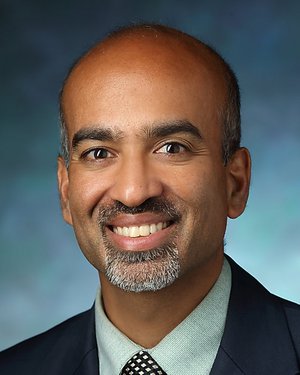
Arun Venkatesan, MD, PhD
Neurology
Highlights
Johns Hopkins Affiliations:
- Johns Hopkins School of Medicine Faculty
About Arun Venkatesan
Primary Academic Title
Professor of Neurology
Background
Dr. Arun Venkatesan serves as Director of the Johns Hopkins Encephalitis Center, where he directs clinical activities and research. At the center he has developed a multidisciplinary program devoted to optimizing diagnosis and management of patients with infectious and autoimmune encephalitis and understanding mechanisms of disease in order to develop more effective treatments. He also plays an active role in the Johns Hopkins Multiple Sclerosis and Transverse Myelitis Centers.
He received his undergraduate degree in biomedical engineering from the University of California, Berkeley in 1994, followed by a Ph.D. in microbiology and immunology and an M.D. from the University of California, Los Angeles. He completed his residency in neurology and fellowship in neuroinfectious and neuroinflammatory diseases at Johns Hopkins, after which he was appointed to the faculty in the department of neurology in 2007. His laboratory research focuses on defining causes and mechanisms of central nervous system injury in the setting of infection and neuroinflammation, with a goal towards developing protective and regenerative strategies. He has received funding from the National Institutes of Health, Howard Hughes Medical Institute, National Multiple Sclerosis Society, and Maryland Stem Cell Research Fund.
Centers and Institutes
Research Interests
How to promote repair of the damaged nervous system, Understanding how infection and inflammation damage the nervous system
Research Summary
Dr. Venkatesan’s research interests focus on how infectious and immunologic diseases affect the brain. In particular, he is interested in understanding how HIV infection and co-morbid conditions associated with HIV (i.e. substance abuse) affect a process called neurogenesis, the formation of new neurons in the adult brain. Neurogenesis may play an important role in maintaining normal cognitive function, and disruption of neurogenesis by HIV infection, inflammation, or substance abuse may have significant clinical consequences. Through the use of both cell culture and animal model systems, Dr. Venkatesan has found that both HIV and drugs of abuse impair neurogenesis in the hippocampus, an area of the brain important for learning and memory. He is currently focused on developing therapies that restore neurogenesis during infection or inflammation. He is exploring both drug-based approaches and cell-based approaches (transplantation of cells into the brain) with the eventual goal of preventing or reversing cognitive dysfunction in patients with HIV infection, substance abuse, or neuroinflammatory disorders.
Google Scholar
http://scholar.google.com/scholar?hl=en&q=Arun+Venkatesan&btnG=&as_sdt=1%2C21&as_sdtp=
Selected Publications
- 1. Das S, Ott M, Yamane A, Venkatesan A, Gupta S and Dasgupta A. 1998. Inhibition of internal entry site (IRES)-mediated translation by a small yeast RNA: a novel strategy to block hepatitis C virus protein synthesis. Front Biosci 3:1241-52.
2. Venkatesan A, Das S and Dasgupta A. 1999. Structure and function of a small RNA that selectively inhibits internal ribosome entry site-mediated translation. Nucleic Acids Res 27:562-572.
3. Venkatesan A and Dasgupta A. 2001. Novel fluorescence-based screen to identify small synthetic internal ribosome entry site elements. Mol Cell Biol 21:2826-2837.
4. Venkatesan A and Dasgupta A. 2003. Cell cycle regulation of hepatitis C and encephalomyocarditis virus internal ribosome entry site-mediated translation in human embryonic kidney 293 cells. Virus Res 94:85-95.
5. Dasgupta A, Das S, Izumi R, Venkatesan A, Bharat B. 2004. Targeting internal ribosome entry site (IRES)-mediated translation to block hepatitis C and other RNA viruses. FEMS Microbiol Lett 234:189-199.
6. Jhaveri R, Kundu P, Shapiro AM, Venkatesan A, Dasgupta A. 2005. Effect of hepatitis C virus core protein on cellular gene expression: specific inhibition of cyclooxygenase 2. J Infect Dis 191:1498-1506.
7. Venkatesan A, Spalding C, Speedie A, Sinha G, Rumbaugh J. 2005. Pseudomonas aeruginosa infective endocarditis presenting as bacterial meningitis. J Infection 51:199-202.
8. Venkatesan A, Frucht S. 2006. Movement disorders after resuscitation from cardiac arrest. Neurol Clin 24:123-132.
9. Steiner J, Haughey N, Wenxue L, Venkatesan A, Anderson C, Reid R, Malpica T, Butterfield A, and Nath A. 2006. Oxidative stress and therapeutic approaches in HIV dementia. Antioxidants and Redox Signaling in Neurodegenerative Disorders 8:2089-100.
10. Venkatesan A, Selnes O, Wojna V, McArthur JC, and Nath A. 2006. Neuropsychological consequences of HIV and drug abuse. American Journal of Infectious Diseases 2: 90-97.
11. Venkatesan A, Nath A, Ming G-L, Song H. 2007. Adult hippocampal neurogenesis: regulation by HIV and drugs of abuse. Cell Mol Life Sci.
Honors
- Best Multispecialty Video, Society of Laparoscopic Surgeons, 1/1/09
- Excellence in Teaching Award, Johns Hopkins University, 1/1/09
- Robotic Technology Prize Paper, Robotics in residency training: the evolution of technology and surgical education." American Association of Gynecologic Laparoscopists, 1/1/08
- Special Excellence in Endoscopic Procedures, Awarded by The American Association of Gynecologic Laparoscopists & Johns Hopkins University, 1/1/07
- Excellence in Teaching Award, Johns Hopkins University, 1/1/07
- The "Big Picture" Award for Chief Resident, Johns Hopkins University, 1/1/07
- Excellence in Teaching Award, Johns Hopkins University, 1/1/05
- Phi Beta Kappa Honor Society, 1/1/99
- National Hispanic Scholar, 1/1/95
Locations
- Johns Hopkins Outpatient Center
- 601 North Caroline Street, Floor 5, Baltimore, MD 21287
- phone: 410-955-9441
- fax: 410-955-6402
Expertise
Education
Johns Hopkins University School of Medicine
Residency, Neurology, 2006David Geffen School of Medicine at UCLA
Medical Education, MD PhD, 2002Board Certifications
Neurology
American Board of Psychiatry and Neurology, 2008Insurance
- Aetna
- CareFirst
- Cigna
- First Health
- Geisinger Health Plan
- HealthSmart/Accel
- Humana
- Johns Hopkins Health Plans
- MultiPlan
- Pennsylvania's Preferred Health Networks (PPHN)
- Point Comfort Underwriters
- Private Healthcare Systems (PHCS)
- UnitedHealthcare
- Veteran Affairs Community Care Network (Optum-VACCN)
